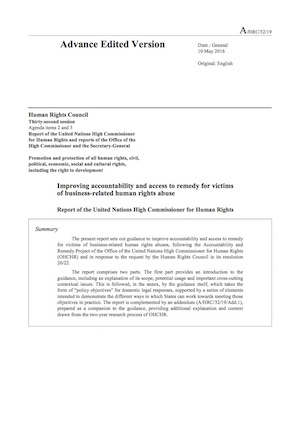Shift supported two rounds of workshops with member states that fed into this report’s development, particularly the recommendations on cross-border cases. The overview below is excerpted from the report.
Overview
The present report sets out guidance to improve accountability and access to remedy for victims of business-related human rights abuses, following the Accountability and Remedy Project of the Office of the United Nations High Commissioner for Human Rights (OHCHR) and in response to the request by the Human Rights Council in its resolution 26/22.
The report comprises two parts. The first part provides an introduction to the guidance, including an explanation of its scope, potential usage and important cross-cutting contextual issues. This is followed, in the annex, by the guidance itself, which takes the form of “policy objectives” for domestic legal responses, supported by a series of elements intended to demonstrate the different ways in which States can work towards meeting those objectives in practice. The report is complemented by an addendum (A/HRC/32/19/Add.1), prepared as a companion to the guidance, providing additional explanation and context drawn from the two-year research process of OHCHR.
Accountability and access to remedy: the urgent need for action
Business enterprises can be involved with human rights abuses in many different ways; because of the adverse impacts that business enterprises may cause or contribute to through their own activities, or by virtue of their business relationships. Ensuring the legal accountability of business enterprises and access to effective remedy for persons affected by such abuses is a vital part of a State’s duty to protect against business-related human rights abuse.
At present, accountability and remedy in such cases is often elusive. Although causing or contributing to severe human rights abuses would amount to a crime in many jurisdictions, business enterprises are seldom the subject of law enforcement and criminal sanctions.
Human rights impacts caused by business activities give rise to causes of action in many jurisdictions, yet private claims often fail to proceed to judgment and, where a legal remedy is obtained, it frequently does not meet the international standard of “adequate, effective and prompt reparation for harm suffered”.
State-based judicial mechanisms are not the only means of achieving accountability and access to remedy in cases of business-related human rights abuses. Other possibilities may include State-based non-judicial mechanisms and non-State grievance mechanisms, such as operational level grievance mechanisms. However, effective State-based judicial mechanisms are “at the core of ensuring access to remedy”.
Those seeking to use judicial mechanisms to obtain a remedy face many challenges. While those challenges vary from jurisdiction to jurisdiction, there are persistent problems common to many jurisdictions. These include fragmented, poorly designed or incomplete legal regimes; lack of legal development; lack of awareness of the scope and operation of regimes; structural complexities within business enterprises; problems in gaining access to sufficient funding for private law claims; and a lack of enforcement. Those problems have all contributed to a system of domestic law remedies that is “patchy, unpredictable, often ineffective and fragile”.
The challenges are exacerbated in cross-border cases. While many domestic legal regimes focus primarily on within-territory business activities and impacts, the realities of global supply chains, cross-border trade, investment, communications and movement of people are placing new demands on domestic legal regimes and those responsible for enforcing them.
The experiences of those seeking remedy suggest that there remain serious deficiencies in the implementation by many States of their international obligations with respect to access to remedy. The right to an effective remedy for harm is a core tenet of international human rights law. The obligations of States with respect to this right have been reflected in the Guiding Principles on Business and Human Rights: Implementing the Protect, Respect and Remedy Framework in terms of a “State duty to protect” against business-related human rights abuses, of which providing access to an effective remedy is an integral part.
Rectifying these deficiencies — which, in many cases, are rooted in wider social, economic and legal challenges — will not be straightforward. It will require concerted and multifaceted efforts from all States, encompassing actions relating to law reform and legal development, improvements to the functioning of judicial mechanisms, law enforcement, policy development and closer international cooperation. However, this is essential work towards realizing the imperatives of accountability and remedy for business-related human rights abuses.




